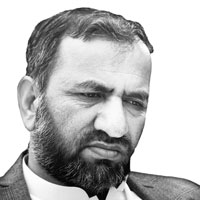The tiny and fabulously wealthy Gulf state of Qatar is the scene of the latest battle between the U.S. and Mullah Mohammad Omar’s Taliban insurgency, but this time the struggle is about the possibility of peace. As part of its strategy of withdrawing from Afghanistan by the end of 2014 and leaving behind a relatively stable country, not one enflamed by continuing civil war, American officials have begun holding tentative talks with a handful of Afghans who are believed to represent the insurgency, one of whom may have a pipeline to the reclusive, one-eyed Taliban leader. According to Taliban and senior Afghan government officials who say they have inside knowledge of the talks, little if any progress has been made so far. Both sides have widely diverse goals and expectations, and seem to be talking past, and not to, each other. But the fact that the discussions are taking place at all can only be positive, particularly since the Taliban publicly insist they are opposed to any negotiations before a total withdrawal of U.S. and NATO forces from Afghanistan.
Emily Horne, a spokeswoman for the State Department, would not confirm the talks but said more generally: “As the Secretary [of State Hillary Clinton] laid out in her Feb. 18 speech at the Asia Society, and as we reaffirmed at Bonn, the United States views an inclusive Afghan-led reconciliation process as an important component of our strategy to isolate al Qaeda and prevent its return to Afghanistan.”
“Just the fact that everybody agrees, ‘We’ll talk,’ is a very important step forward,” said Richard Barrett, coordinator of the al Qaeda-Taliban monitoring team of the United Nations.
According to a Taliban official who has been briefed on the talks, the U.S. side played hardball in the previous meetings. Washington’s negotiators warned the Taliban that the guerrillas would not be able to come back to power simply by waiting for a foreign troop withdrawal and then trying to fight their way back into Kabul and other cities. Without a negotiated peace, the Americans said, it was unlikely that the U.S. would ever withdraw totally and that it would leave behind enough firepower to ensure that the Taliban never returned to power. As a result it would be better for the insurgency to negotiate a peaceful end to the conflict in the hopes of getting at least part of the loaf.

In a show of good faith, the Americans outlined the possibility of delineating “ceasefire zones” that could be a step toward the cessation of hostilities. They also demanded that the Taliban completely sever its ties with al Qaeda and not try to undermine the elected Afghan government. In return, the Americans said they were willing to consider the release of some senior Taliban prisoners. “The Americans were very arrogant and tough,” the Taliban official told The Daily Beast.
The Taliban representatives, however, were not ready, or mandated, for such a detailed discussions, say the Taliban official and a senior Afghan official who is also aware of the talks. “The Taliban do not have a clear strategy for the talks,” says the Taliban official. The insurgent negotiators are neither influential nor senior people, nor do they seem to carry any weight with top Taliban military commanders. “These guys are not important,” said the senior Afghan official dismissively. “They are nonmilitant Taliban.” The leading Taliban negotiator is Tayyab Agha, an Afghan in his late 30s who speaks fluent English and is the former chief of staff of Mullah Omar’s office during the Taliban regime. He is said to have access to Mullah Omar, who is believed to be under Pakistani protection somewhere in Pakistan’s Baluchistan province, just across the border from Afghanistan. Given his dependency on Pakistan, the extent of Mullah Omar’s power to make crucial decisions is unknown. “Mullah Omar is alive,” said the senior Afghan official. “But it’s unclear how much authority he has and how much freedom he has to make decisions.”

Perhaps the second most important insurgent negotiator is Mullah Abdul Aziz, a former first secretary of the defunct regime’s embassy in the United Arab Emirates and now a businessman in Doha. The Taliban and the senior Afghan official say these Taliban interlocutors have one clear goal in mind: the release of senior Taliban prisoners in U.S. custody at Guantánamo Bay and at Bagram Air Base, just north of Kabul. “Their willingness to talk is limited to specific goals,” said the senior Afghan official, who declined to be named because of the sensitivity of the subject. “For now they only want to talk of a prisoner release.” Mullah Omar is known to be keen to get the release of as many senior commanders as possible, hoping that they can somehow replace the scores of his best field officers who have been killed in combat over the years. Among the top names that have been mentioned for release in the talks are Mullah Fazil Akhund, a brutal former chief of army staff who surrendered in northern Afghanistan in late 2001; Mullah Nurullah Nuri, a former senior governor in the north, and Mullah Khairullah Khairkhawah, a former interior minister, all incarcerated in Guantánamo.
The Qatar venue is one thing both the Taliban and the U.S. both agree upon. Both the U.S. and President Hamid Karzai’s government wanted an “address” at which they could contact the insurgency whose leaders largely shelter in safe havens inside Pakistan and therefore are believed to be subject to Pakistani pressure if not dictates. Turkey also was discussed as a possibility for a Taliban “office.” But insurgent leaders decided that Turkey was too “pro-Kabul.” Saudi Arabia also was a possibility but the Saudis themselves were lukewarm about the idea. At first Karzai tried to veto the choice of Qatar for the talks, piqued that he had not been consulted nor had he had a representative invited to the four secret meetings so far between the Taliban and the U.S. As a sign of his objection, he summarily withdrew his ambassador from Doha earlier this month. But he has since relented, even though his first choice for a Taliban postal address was Kabul.
“Qatar is a good place to do it. You have a lot of stability,” said Patrick Theros, who served as U.S. ambassador to Qatar from 1995 to 1998. “It’s small enough to have everyone protected and to have their identities protected.” In other words, there are not a lot of journalists around. “It’s not Cairo, where conspiracies are hanging out every window,’” said Theros. “In a political sense, it’s a rather boring place.”
Senior Afghan government officials believe the chief reason that government representatives have not been invited to the talks is the Taliban’s insistence that the discussions should be centered on the release of senior Taliban presently in U.S. custody. “We want to talk to the Taliban about the reconciliation process,” said the senior Afghan official. “But they don’t want to talk to us about peace. They are only interested in talking to the Americans about their prisoners.”
In the four secret parlays over the past few months, two in Germany and two in Qatar, Agha has led the Taliban side backed by former diplomat and now Qatar businessman Aziz. In the fourth meeting in Qatar earlier this month, three more Taliban-linked Afghans joined in: Maulvi Shahabuddin Dilvar, a former Taliban ambassador to Pakistan and Saudi Arabia, Mullah Abbas Akhund, a former minister of health, and Sheikh Said Rasul, who runs a madrassa in Pakistan.
Afghan government officials, who are less than keen on the Qatar talks, think the U.S. may believe wrongly that by getting the Taliban to talk in Qatar, they will be lessening Pakistan’s considerable influence on the insurgency. “Geographic distance from Pakistan is not important,” said the senior Afghan official. “There’s no proof that the Taliban want to distance themselves from Pakistan.”
Indeed, Pakistan still holds most of the cards in any moves toward an Afghan peace deal. And so far Pakistan does not seem to be pushing the Taliban toward the negotiating table. “Pakistan has made some nice gestures and said some nice words but has done nothing in practice to help so far,” said the senior Afghan official. “The success of any talks may depend of the quality of relations between Pakistan and the U.S.,” added the Taliban official. “If their present sour relations get much worse, Pakistan may not have any interest in seeing the U.S. get out of Afghanistan with honor.” In that worst-case scenario, there would be no winners and only losers in Afghanistan.








